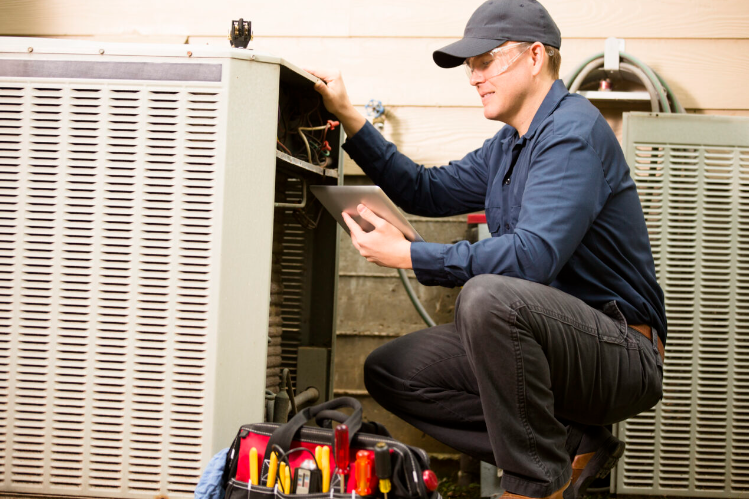
AC Replacement
Signs It’s Time for AC Replacement
Recognizing the Age Factor
One of the first indicators that you may need an AC replacement is the age of your unit. Generally, air conditioning units last between 10 to 15 years. If your system is nearing or has surpassed this range, it’s time to consider an upgrade. While older units can still function, they often do so with reduced efficiency and higher energy consumption. Over time, these inefficiencies can lead to increased energy bills and a less comfortable home environment. Moreover, older systems lack the advanced technology and energy-saving features found in newer models. So, if your AC unit is showing signs of age, it might be more cost-effective to invest in a new, more efficient system. After all, just like a car that’s seen too many miles, an old AC unit can become a money pit, constantly needing repairs.
Frequent Breakdowns and Repairs
Another clear sign that you might need an AC replacement is the frequency of breakdowns and repairs. If you find yourself calling the HVAC technician more often than not, it’s a red flag. Constantly fixing your unit can become expensive, and those costs can quickly add up. In some cases, the price of multiple repairs can approach or even exceed the cost of a new unit. Transitioning to a new system can save you from these frequent disruptions and the stress of an unreliable cooling system. Additionally, frequent breakdowns often indicate that the system is working harder than it should, which can lead to more significant issues over time. Therefore, if you’re tired of the repair cycle, it might be time to consider an AC replacement.
Rising Energy Bills
A significant and often overlooked sign of needing an AC replacement is the rise in your energy bills. While utility costs can fluctuate due to various factors, a consistent increase in your energy bills can indicate that your AC unit is losing efficiency. As air conditioning units age, they tend to consume more energy to deliver the same cooling performance. This inefficiency not only hits your wallet but also increases your carbon footprint. Transitioning to a newer, more energy-efficient unit can drastically reduce your monthly bills and help you contribute to a greener environment. Additionally, newer models often come with features like programmable thermostats and variable speed compressors, which optimize energy use. So, if you notice your energy costs climbing, it might be a sign that an AC replacement is in your near future.
Uneven Cooling and Comfort Issues
Inconsistent Temperatures Throughout Your Home
Have you ever walked from one room to another and felt a significant temperature difference? If so, it could be a sign that your AC unit is struggling to distribute air evenly, indicating the need for an AC replacement. Uneven cooling can be caused by several factors, such as a failing compressor, aging ductwork, or a unit that’s too small for your home. Not only does this make your living environment uncomfortable, but it can also indicate that your system is working harder than necessary, leading to increased wear and tear. While you might think that this is just a minor inconvenience, it can actually be a sign of a more significant underlying issue. So, if you find yourself constantly adjusting the thermostat or using fans to cool certain rooms, it’s time to consider an upgrade.
Strange Noises and Unpleasant Odors
Another telltale sign that an AC replacement might be necessary is the presence of strange noises or unpleasant odors coming from your unit. While it’s normal for an AC to make some noise when it kicks on, loud or unusual sounds like grinding, squealing, or banging are often indicators of serious problems. Similarly, if you notice any musty or burning smells, it could point to issues like mold growth in the ductwork or electrical problems. These signs not only compromise your comfort but can also pose health risks and fire hazards. Transitioning to a new system can eliminate these issues and restore a peaceful and pleasant environment in your home. So, if your AC unit sounds like it’s auditioning for a horror movie or smells like a gym locker, it’s probably time to look into a replacement.
High Humidity Levels and Poor Air Quality
Increased Humidity Indoors
High humidity levels inside your home can also signal that it’s time for an AC replacement. A well-functioning air conditioner should not only cool your home but also dehumidify the air. If you notice that your home feels clammy or that windows are fogging up more frequently, it could mean that your AC unit is no longer able to effectively control the humidity. This can lead to a host of problems, including mold growth, wood damage, and an overall uncomfortable living environment. While you might be tempted to blame the weather, high indoor humidity is often a sign of an inefficient AC system. Upgrading to a newer model can improve humidity control, making your home more comfortable and safe. Therefore, if you feel like you’re living in a sauna, it might be time to consider an AC replacement.
Decline in Air Quality
A noticeable decline in air quality is another sign that you may need an AC replacement. Older units or those in poor condition can become breeding grounds for dust, mold, and other allergens. If you or your family members start experiencing unexplained allergies, respiratory issues, or frequent illnesses, it could be due to poor indoor air quality caused by a failing AC unit. Transitioning to a new system with advanced filtration features can significantly improve the air quality in your home, providing a healthier environment. Additionally, newer units often have features that can remove pollutants and allergens more effectively, ensuring that you breathe clean, fresh air. So, if you’ve noticed a decline in air quality, it’s worth considering an upgrade.
Frequent Cycling and Inadequate Cooling
AC Unit Constantly Turning On and Off
One of the more annoying signs that you may need an AC replacement is frequent cycling. If your unit is constantly turning on and off, it may be struggling to maintain the set temperature. This could be due to a range of issues, from a malfunctioning thermostat to an oversized or undersized unit. Not only does frequent cycling make your home less comfortable, but it can also lead to higher energy bills and shorten the lifespan of your system. Furthermore, it places unnecessary stress on the components, making them wear out faster. So, if your AC seems to have a mind of its own, constantly cycling on and off, it’s a good idea to consult with a professional about the possibility of a replacement.
Inadequate Cooling Performance
Lastly, inadequate cooling performance is a clear sign that it might be time for an AC replacement. If your unit struggles to cool your home on hot days, it may be due to a loss of refrigerant, a failing compressor, or other serious issues. While minor adjustments and repairs can sometimes resolve these problems, an older unit will eventually reach a point where it can no longer keep up. Transitioning to a new, more efficient system can provide the reliable cooling you need to stay comfortable during the hot summer months. Plus, newer models often come with advanced features that offer better temperature control and energy efficiency. So, if your AC unit feels more like a fan than an air conditioner, it’s time to consider an upgrade.
Conclusion: Time for an Upgrade?
Making the Decision for AC Replacement
Deciding to replace your AC unit is a significant investment, but it’s one that can offer numerous benefits in the long run. From improved energy efficiency and reduced energy bills to better comfort and air quality, the advantages are clear. While it might be tempting to keep patching up your old system, there comes a point where an AC replacement is the smarter, more cost-effective choice. If you’ve noticed any of the signs mentioned above, it’s worth consulting with a professional to assess your options. Remember, a well-functioning AC unit is crucial for maintaining a comfortable and healthy living environment. So, don’t hesitate to make the upgrade when the time comes. After all, isn’t it better to enjoy a cool, comfortable home without the constant worry of breakdowns and repairs?


